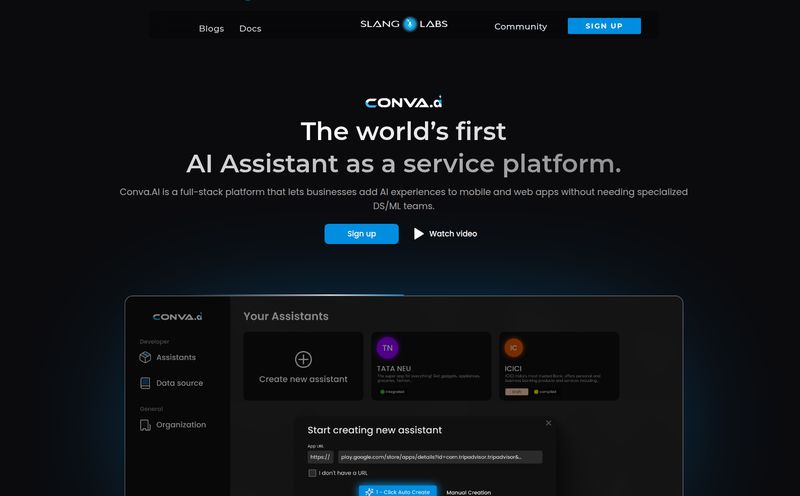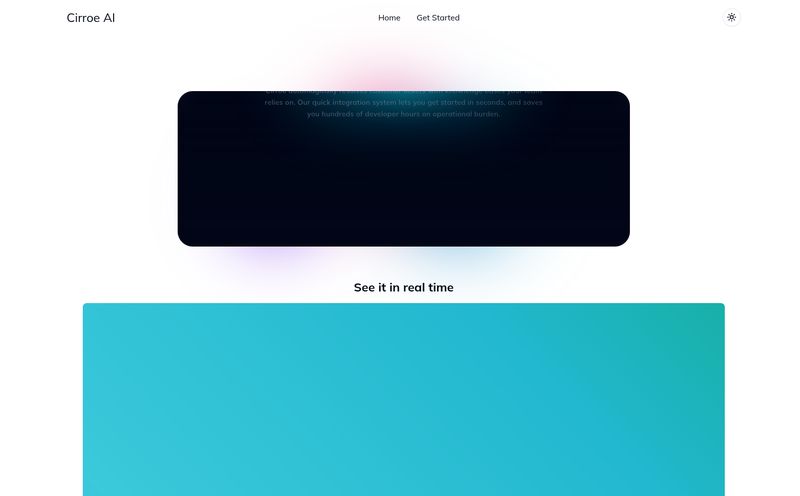You know that feeling when you stumble upon a new tool that just clicks? For me, as someone who lives and breathes SEO and tech trends, it’s a little shot of dopamine. I was deep in a rabbit hole of GPT-wrappers and new AI applications a while back when a name popped up: Apollo Co-Pilot. The pitch was simple, elegant, and hit on a trend I've been watching for years: AI in athletics.
The idea of an AI-powered sports analytics platform that could watch a video of you, say, shooting a basketball and give you instant, actionable feedback... that’s the future, right? It’s like having a world-class coach in your pocket, ready 24/7. I was hooked. I bookmarked it, planning to circle back and do a deep dive.
And when I finally did... I found nothing. A digital ghost town. A dead end. So what happened?
So, What Was Apollo Co-Pilot Supposed to Be?
From what I could piece together from the digital breadcrumbs it left behind, Apollo Co-Pilot was designed to be a bridge between athletes and elite-level coaching. You, the athlete (or your coach), would upload training videos. The platform’s AI, built on a GPT model, would then analyze your form, technique, and movements. It wasn’t just about saying “good job.” It promised comprehensive performance analytics and personalized training regimens.
Imagine you’re a high school soccer player trying to perfect your free kick. You record a few attempts, upload them, and within minutes, an AI breaks down your posture, your follow-through, the angle of your plant foot. That’s the dream they were selling. It’s a powerful concept that could genuinely democratize access to high-quality coaching, especially for younger athletes or those in more remote areas.

Visit Apollo Co-Pilot
The Promised Features on the Horizon
The ambition didn't stop at video analysis. The roadmap apparently included some really exciting stuff. We’re talking about potential integration with smart gadgets like wearables and trackers to pull in even more data—heart rate, speed, power output. They even floated the idea of creating custom nutritional plans. It was shaping up to be a holistic athletic development platform. But as with many ambitious beta projects, there was a catch.
The Fine Print: A Reality Check
Every great idea has its practical hurdles. For Apollo Co-Pilot, the limitations were pretty clear, even in its conceptual stage. It was a beta, and that came with some heavy restrictions. Users were reportedly limited to just three video uploads and a cap of 100 API calls per day.
Now, for those of us in the tech world, that API limit is a massive red flag. Building a service on another company's tech, especially something as resource-intensive as OpenAI's GPT for video analysis, is like building a skyscraper on rented land. Those API calls cost money—a lot of money. One hundred calls a day barely covers a single user, let alone a team or a growing user base. It’s a classic startup problem: how do you scale a service whose core function has a high, variable cost? I suspect this might be a big part of our story's mystery.
My Investigation: Where the Trail Went Cold
When I finally went to check out the platform for myself, I was met with the image you see above. A generic Wix landing page saying, “Looks like this domain isn’t connected to a website yet.” Oof. It’s the digital equivalent of a “Sorry, we’re closed” sign on a dusty, abandoned storefront.
There's no official statement, no farewell blog post, no redirect. Just... silence. Did they run out of funding? Did the API costs prove insurmountable, just as I suspected? Or maybe they were acquired and the project was absorbed into something bigger (the optimistic take!). We may never know for sure, and that's a shame. It feels like a missed opportunity.
The Bigger Picture: AI in Sports Coaching Isn’t Going Anywhere
Just because Apollo Co-Pilot seems to have vanished doesn’t mean the idea died with it. The trend of AI-powered sports analytics is booming. This isn’t science fiction; it’s happening right now. Companies like Hudl have been dominating team sports analysis for years, and platforms like Coach's Eye provide powerful slow-motion video feedback tools.
What Apollo Co-Pilot was trying to do was layer on that next-level, GPT-driven conversational feedback. And someone else will crack that nut. The demand is there. Every athlete wants an edge, and every coach wants better data to help their players improve. AI is the most logical next step in that evolution.
"The volatility of tech startups is nothing new, but in the AI gold rush, the burn rate for companies reliant on third-party APIs can be absolutely brutal. Promise is one thing, a sustainable business model is another."
Frequently Asked Questions about AI Sports Tech
1. Can AI really replace a human sports coach?
Not entirely, and it probably shouldn't. The best use of this technology is as a 'co-pilot' (the name was perfect!). It provides objective data and analysis, freeing up a human coach to focus on the psychological, motivational, and strategic parts of the game. It’s a tool to augment coaching, not replace it.
2. What sports can benefit from AI video analysis?
Almost any sport that involves technique and form. Think golf swings, tennis serves, baseball pitches, weightlifting form, swimming strokes, and running gait. If it can be recorded and there's a 'correct' or 'optimal' way to do it, AI can analyze it.
3. How much do these AI coaching tools typically cost?
It varies wildly. Some apps have free basic versions with in-app purchases for advanced features. More professional platforms, like Hudl, are subscription-based and can cost hundreds or thousands of dollars a year, usually targeting teams and institutions rather than individual athletes.
4. Is my athletic data safe with these platforms?
A very important question. You should always check the platform's privacy policy. Reputable companies will have clear guidelines on how your data is used, stored, and protected. With any new startup, especially in the beta phase, this is a bigger risk. Stick to established players if you have serious privacy concerns.
5. Was Apollo Co-Pilot a real company?
It appears to have been a real project in its early stages. It gained some traction in tech circles as a concept and beta product. However, its disappearance suggests it never made it to a full public launch or failed to secure the resources needed to continue.
Final Thoughts on a Promising Idea
The story of Apollo Co-Pilot is a classic tale from the wild west of the AI boom. It’s a reminder of how quickly things can change. An idea can be brilliant, the tech can be exciting, but execution and financial viability are what separate the ghosts from the giants.
While I'm bummed I never got to try it, the ghost of Apollo Co-Pilot makes me even more excited for what's next. Someone will pick up this torch. The AI sports coach is coming. It just might have a different name.



